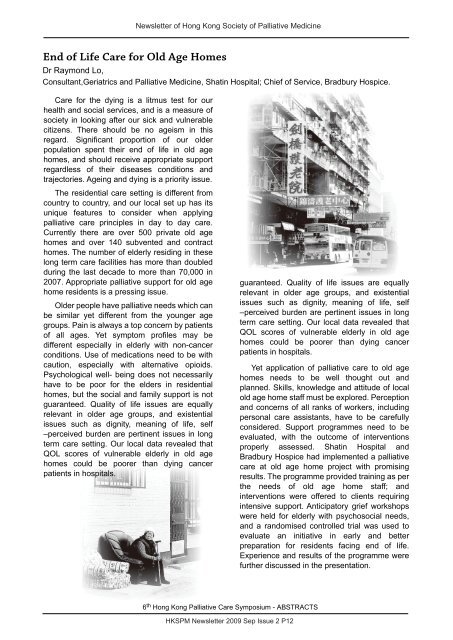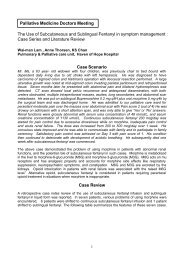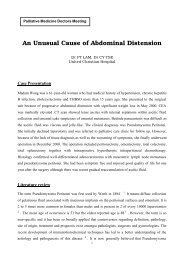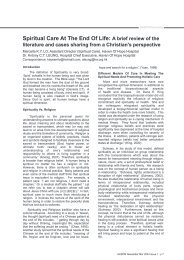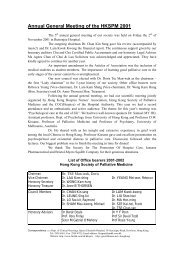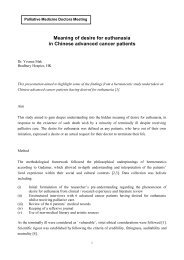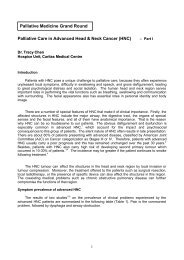Newsletter <strong>of</strong> <strong>Hong</strong> <strong>Kong</strong> <strong>Society</strong> <strong>of</strong> <strong>Palliative</strong> <strong>Medicine</strong>End <strong>of</strong> Life Care for Old Age HomesDr Raymond Lo,Consultant,Geriatrics and <strong>Palliative</strong> <strong>Medicine</strong>, Shatin Hospital; Chief <strong>of</strong> Service, Bradbury Hospice.Care for the dying is a litmus test for ourhealth and social services, and is a measure <strong>of</strong>society in looking after our sick and vulnerablecitizens. T<strong>here</strong> should be no ageism in thisregard. Significant proportion <strong>of</strong> our olderpopulation spent their end <strong>of</strong> life in old agehomes, and should receive appropriate supportregardless <strong>of</strong> their diseases conditions andtrajectories. Ageing and dying is a priority issue.The residential care setting is different fromcountry to country, and our local set up has itsunique features to consider when applyingpalliative care principles in day to day care.Currently t<strong>here</strong> are over 500 private old agehomes and over 140 subvented and contracthomes. The number <strong>of</strong> elderly residing in theselong term care facilities has more than doubledduring the last decade to more than 70,000 in2007. Appropriate palliative support for old agehome residents is a pressing issue.Older people have palliative needs which canbe similar yet different from the younger agegroups. Pain is always a top concern by patients<strong>of</strong> all ages. Yet symptom pr<strong>of</strong>iles may bedifferent especially in elderly with non-cancerconditions. Use <strong>of</strong> medications need to be withcaution, especially with alternative opioids.Psychological well- being does not necessarilyhave to be poor for the elders in residentialhomes, but the social and family support is notguaranteed. Quality <strong>of</strong> life issues are equallyrelevant in older age groups, and existentialissues such as dignity, meaning <strong>of</strong> life, self–perceived burden are pertinent issues in longterm care setting. Our local data revealed thatQOL scores <strong>of</strong> vulnerable elderly in old agehomes could be poorer than dying cancerpatients in hospitals.guaranteed. Quality <strong>of</strong> life issues are equallyrelevant in older age groups, and existentialissues such as dignity, meaning <strong>of</strong> life, self–perceived burden are pertinent issues in longterm care setting. Our local data revealed thatQOL scores <strong>of</strong> vulnerable elderly in old agehomes could be poorer than dying cancerpatients in hospitals.Yet application <strong>of</strong> palliative care to old agehomes needs to be well thought out andplanned. Skills, knowledge and attitude <strong>of</strong> localold age home staff must be explored. Perceptionand concerns <strong>of</strong> all ranks <strong>of</strong> workers, includingpersonal care assistants, have to be carefullyconsidered. Support programmes need to beevaluated, with the outcome <strong>of</strong> interventionsproperly assessed. Shatin Hospital andBradbury Hospice had implemented a palliativecare at old age home project with promisingresults. The programme provided training as perthe needs <strong>of</strong> old age home staff; andinterventions were <strong>of</strong>fered to clients requiringintensive support. Anticipatory grief workshopswere held for elderly with psychosocial needs,and a randomised controlled trial was used toevaluate an initiative in early and betterpreparation for residents facing end <strong>of</strong> life.Experience and results <strong>of</strong> the programme werefurther discussed in the presentation.6 th <strong>Hong</strong> <strong>Kong</strong> <strong>Palliative</strong> Care Symposium - ABSTRACTSHKSPM Newsletter 2009 Sep Issue 2 P12
Newsletter <strong>of</strong> <strong>Hong</strong> <strong>Kong</strong> <strong>Society</strong> <strong>of</strong> <strong>Palliative</strong> <strong>Medicine</strong>Crisis in <strong>Palliative</strong> CareDr Lam Po Tin,Department <strong>of</strong> <strong>Medicine</strong> & Geriatrics,United Christian Hospital.Correspondence: lampt@ha.org.hk(Presented in 6 th <strong>Hong</strong> <strong>Kong</strong> <strong>Palliative</strong> CareSymposium)Definition <strong>of</strong> Crisis in <strong>Palliative</strong> CareCrisis means a time <strong>of</strong> great danger,difficulty or uncertainty when problems must besolved or important decisions must be made. 1 Toindividuals, it is the subjective reaction to astressful life experience that compromises theindividual’s stability and ability to cope orfunction 2 .<strong>Palliative</strong> care aims to improve quality <strong>of</strong> lifeby early identification, impeccable assessmentand treatment <strong>of</strong> symptoms while meeting theneeds <strong>of</strong> patients with advanced andprogressive diseases. It comprises diseasespecificand symptom-guided interventions, withemphasis on preparing patients and theirfamilies for foreseeable, distressing clinicalproblems. 3 Hence, any unexpected change nearthe end-<strong>of</strong>-life may be considered as crisis to thepalliative care patient, family and even staff untilmore information about the change can beobtained.Crisis in palliative care is not exactlyequivalent to medical or oncologicalemergencies which are defined by diseasespecificprocesses, such as spinal cordcompression, pathological bone fractures,superior vena caval obstruction, septicneutropenia, hypercalcemia, hyponatraemia. Inthese situations, we focus on “what can be doneto save life?” with diagnostic or therapeuticalgorithms, and aggressive treatment cansometimes enhance overall survival. However,towards the end-<strong>of</strong>-life when death is anexpected and accepted outcome; we questionthe emergency nature <strong>of</strong> these situations, wequestion the mechanisms and algorithms usedin standard emergency treatment to be used forcrisis in palliative care. The priorities <strong>of</strong> palliativecare gradually shift towards the end-<strong>of</strong>-life.Insteadad, we focus on “what is the appropriatetreatment for this patient in this particularsituation?” 3Precipitating events and AssessmentWhen a crisis occurs near the end-<strong>of</strong>-life, theclinician should carry out an impeccableassessment including (1) identification <strong>of</strong> theprecipitating events; (2) prompt understanding<strong>of</strong> the underlying disease-specific or pathophysiologicalprocesses; (3) determination onwhether active/life sustaining treatment couldprolong life or maintain quality <strong>of</strong> life; (4)prognostication – both tumour and co-morbidityrelated; (5) patient’s wish; (6) extent <strong>of</strong> clinicaldecline or course <strong>of</strong> expected illness; (7) attitude<strong>of</strong> family ; and finally (8) overall care. All thesemight have a more decisive role than disease -specific features and the complexity <strong>of</strong> atherapeutic decision during crisis near the end <strong>of</strong>life usually requires the expertise <strong>of</strong> amulti-pr<strong>of</strong>essional palliative care team. Theprecipitating events can be (i) physical-related,e.g. acute dyspnoea, acute delirium, acute painor massive haemorrhage; (ii) psychologicalrelatede.g. suicidal attempt; (iii) social-relatede.g. acute decompensating family or caregiversuch as caregiver fatigue / caregiver illness; and(iv) spiritual-related, e.g. existential distress.Clinician and the palliative care team should befamiliar with the clinical approach in managingthese precipitating events.Decision making and its factorsAt the time <strong>of</strong> crisis in palliative care, eithercategory <strong>of</strong> decisions should be made, namelythe decision to use potentially life-sustainingtreatments or decisionsto use treatmentmodalities that emphasize quality <strong>of</strong> life &comfort care. 4 However, such discussions onmedical decisions can be facilitated prior to theoccurrence <strong>of</strong> crisis. The optimal timing for thisdiscussion is during a routine outpatient visit,during which the patient should have anopportunity to learn from the physician theanticipated disease course, the potentialtreatment options, and together with thephysician, define the goals <strong>of</strong> care in case acutecrisis arises. Needless to say, the physician hasto balance the anxiety <strong>of</strong> alerting and preparingthe patient and the family for such an eventCrisis in <strong>Palliative</strong> CareHKSPM Newsletter 2009 Sep Issue 2 P13


